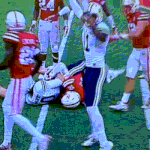J Reuben Clark on the "fiendish butchery" of Japanese Civilians
- snoscythe
- Retired
- Posts: 8811
- Joined: Fri Sep 11, 2009 10:52 am
- Fan Level: BYU Fanatic
- Prediction Group: CougarCorner
- Has thanked: 7 times
- Been thanked: 37 times
Re: J Reuben Clark on the "fiendish butchery" of Japanese Civilians
From the end of the article:HoosierCougar wrote:Dear Top Gun generation kid,snoscythe wrote:I find myself gravitating more and more toward Ezra Taft Benson's perspective on foreign policy, but it's a slow and hard transition as a Top Gun-generation kid.
http://www.latterdayconservative.com/ez ... gn-policy/
Can you give me that ETB blog post in 140 characters or less?
Sincerely,
a millennial generation kid
Ezra Taft Benson wrote:The United States should:
•Establish and maintain a position of independence with regard to other countries
•Avoid political connection, involvement or intervention in the affairs of other countries
•Make no permanent or entangling alliances
•Treat all nations impartially, neither granting nor accepting special privileges from any
•Promote commerce with all free peoples and countries
•Cooperate with other countries to develop civilized rules of intercourse
•Act always in accordance with the “laws of Nations”
•Remedy all just claims of injury to other nations and require just treatment from other nations, standing ready, if necessary to punish offenders
•Maintain a defensive force of sufficient magnitude to deter aggressors.
- snoscythe
- Retired
- Posts: 8811
- Joined: Fri Sep 11, 2009 10:52 am
- Fan Level: BYU Fanatic
- Prediction Group: CougarCorner
- Has thanked: 7 times
- Been thanked: 37 times
Re: J Reuben Clark on the "fiendish butchery" of Japanese Civilians
I think you have it backwards--shouldn't we give the deference to Ezra Taft Benson and seek to reconcile Clark's statement with the eventual prophet's?SpiffCoug wrote:Then please reconcile what Elder Clark said with what Elder Benson said. Because the two seem diametrically opposed to one another.
What's more, Benson actually quoted Clark in support of his position, if you bothered to read his foreign policy article.
- hawkwing
- TV Analyst
- Posts: 13475
- Joined: Tue Jul 24, 2007 11:35 am
- Fan Level: BYU Blue Goggled Homer
- Prediction Group: CougarCorner
- Location: Eagle Mountain, UT
- Has thanked: 63 times
- Been thanked: 38 times
- Contact:
Re: J Reuben Clark on the "fiendish butchery" of Japanese Civilians
snoscythe wrote:Ezra Taft Benson wrote:The United States should:
•Establish and maintain a position of independence with regard to other countries
•Avoid political connection, involvement or intervention in the affairs of other countries
•Make no permanent or entangling alliances
•Treat all nations impartially, neither granting nor accepting special privileges from any
•Promote commerce with all free peoples and countries
•Cooperate with other countries to develop civilized rules of intercourse
•Act always in accordance with the “laws of Nations”
•Remedy all just claims of injury to other nations and require just treatment from other nations, standing ready, if necessary to punish offenders
•Maintain a defensive force of sufficient magnitude to deter aggressors.
And of course the comments from a more recent Prophet, speaking as the Prophet in Conference:
Gordon B. Hinckley wrote: It is clear from these and other writings that there are times and circumstances when nations are justified, in fact have an obligation, to fight for family, for liberty, and against tyranny, threat, and oppression.
- snoscythe
- Retired
- Posts: 8811
- Joined: Fri Sep 11, 2009 10:52 am
- Fan Level: BYU Fanatic
- Prediction Group: CougarCorner
- Has thanked: 7 times
- Been thanked: 37 times
Re: J Reuben Clark on the "fiendish butchery" of Japanese Civilians
Absolutely--I see no contradiction between the two. Part of maintaining a defensive force is a willingness to use it. I don't read President Hinckley as endorsing US foreign policy up to that point, and I don't see him giving a stamp of approval to what followed. I read it as, when attacked, we have an obligation to stand for certain things (family, liberty) and against other things (tyranny, threat, and oppression). He was also clear that "there are times and circumstances", not a perpetual mandate, to fight for/against those things, and that 9/11 presented those circumstances in his view.hawkwing wrote:snoscythe wrote:Ezra Taft Benson wrote:The United States should:
•Establish and maintain a position of independence with regard to other countries
•Avoid political connection, involvement or intervention in the affairs of other countries
•Make no permanent or entangling alliances
•Treat all nations impartially, neither granting nor accepting special privileges from any
•Promote commerce with all free peoples and countries
•Cooperate with other countries to develop civilized rules of intercourse
•Act always in accordance with the “laws of Nations”
•Remedy all just claims of injury to other nations and require just treatment from other nations, standing ready, if necessary to punish offenders
•Maintain a defensive force of sufficient magnitude to deter aggressors.
And of course the comments from a more recent Prophet, speaking as the Prophet in Conference:Gordon B. Hinckley wrote: It is clear from these and other writings that there are times and circumstances when nations are justified, in fact have an obligation, to fight for family, for liberty, and against tyranny, threat, and oppression.
If I did find a conflict between the two, I would defer to President Hinckley as the more recent prophet. I don't give it any additional weight for being at Conference since President Hinckley himself noted that he was sharing his personal views, which eliminated the greater deference we usually give to statements from the Conference pulpit.
- hawkwing
- TV Analyst
- Posts: 13475
- Joined: Tue Jul 24, 2007 11:35 am
- Fan Level: BYU Blue Goggled Homer
- Prediction Group: CougarCorner
- Location: Eagle Mountain, UT
- Has thanked: 63 times
- Been thanked: 38 times
- Contact:
Re: J Reuben Clark on the "fiendish butchery" of Japanese Civilians
Right, I'm not saying there is necessarily conflict between the two statements though I don't read President Hinckley's comments to say you have to wait until attacked to fight against tyranny but rather he feels we have an obligation to defend freedom worldwide against tyranny and oppression. Still I don't think either comments are far out of line with each other. And of course, there is a time and a season for all things, we already know that.snoscythe wrote:Absolutely--I see no contradiction between the two. Part of maintaining a defensive force is a willingness to use it. I don't read President Hinckley as endorsing US foreign policy up to that point, and I don't see him giving a stamp of approval to what followed. I read it as, when attacked, we have an obligation to stand for certain things (family, liberty) and against other things (tyranny, threat, and oppression). He was also clear that "there are times and circumstances", not a perpetual mandate, to fight for/against those things, and that 9/11 presented those circumstances in his view.hawkwing wrote:snoscythe wrote:Ezra Taft Benson wrote:The United States should:
•Establish and maintain a position of independence with regard to other countries
•Avoid political connection, involvement or intervention in the affairs of other countries
•Make no permanent or entangling alliances
•Treat all nations impartially, neither granting nor accepting special privileges from any
•Promote commerce with all free peoples and countries
•Cooperate with other countries to develop civilized rules of intercourse
•Act always in accordance with the “laws of Nations”
•Remedy all just claims of injury to other nations and require just treatment from other nations, standing ready, if necessary to punish offenders
•Maintain a defensive force of sufficient magnitude to deter aggressors.
And of course the comments from a more recent Prophet, speaking as the Prophet in Conference:Gordon B. Hinckley wrote: It is clear from these and other writings that there are times and circumstances when nations are justified, in fact have an obligation, to fight for family, for liberty, and against tyranny, threat, and oppression.
If I did find a conflict between the two, I would defer to President Hinckley as the more recent prophet. I don't give it any additional weight for being at Conference since President Hinckley himself noted that he was sharing his personal views, which eliminated the greater deference we usually give to statements from the Conference pulpit.
- BoiseBYU
- All Star
- Posts: 4336
- Joined: Mon Oct 26, 2009 12:35 pm
- Fan Level: BYU Fan
- Prediction Group: CougarCorner
- Has thanked: 99 times
- Been thanked: 38 times
Re: J Reuben Clark on the "fiendish butchery" of Japanese Civilians
Side point, but I'm uncomfortable giving "prophet status" to statements made by authorities who were not the prophet when they made the statement. The talk you cite to was given to a Farm Bureau Banquet in Idaho in 1968. It should not be given more "status" than President Clark's statement. When a brother becomes the prophet, the mantle descends and what they focus on sometimes changes. When President Benson became the prophet, he spoke nary a word on things political and such but focused on pride and the Book of Mormon and the family. I'm not saying that Elder Benson's talk is not worthy of considering because of his status as an apostle, but not everything they ever said should be elevated if they do become the prophet. So for me President Clark and Benson are both equally worthy of consideration.snoscythe wrote:I think you have it backwards--shouldn't we give the deference to Ezra Taft Benson and seek to reconcile Clark's statement with the eventual prophet's?SpiffCoug wrote:Then please reconcile what Elder Clark said with what Elder Benson said. Because the two seem diametrically opposed to one another.
What's more, Benson actually quoted Clark in support of his position, if you bothered to read his foreign policy article.
- snoscythe
- Retired
- Posts: 8811
- Joined: Fri Sep 11, 2009 10:52 am
- Fan Level: BYU Fanatic
- Prediction Group: CougarCorner
- Has thanked: 7 times
- Been thanked: 37 times
Re: J Reuben Clark on the "fiendish butchery" of Japanese Civilians
Good point.BoiseBYU wrote:Side point, but I'm uncomfortable giving "prophet status" to statements made by authorities who were not the prophet when they made the statement. The talk you cite to was given to a Farm Bureau Banquet in Idaho in 1968. It should not be given more "status" than President Clark's statement. When a brother becomes the prophet, the mantle descends and what they focus on sometimes changes. When President Benson became the prophet, he spoke nary a word on things political and such but focused on pride and the Book of Mormon and the family. I'm not saying that Elder Benson's talk is not worthy of considering because of his status as an apostle, but not everything they ever said should be elevated if they do become the prophet. So for me President Clark and Benson are both equally worthy of consideration.snoscythe wrote:I think you have it backwards--shouldn't we give the deference to Ezra Taft Benson and seek to reconcile Clark's statement with the eventual prophet's?SpiffCoug wrote:Then please reconcile what Elder Clark said with what Elder Benson said. Because the two seem diametrically opposed to one another.
What's more, Benson actually quoted Clark in support of his position, if you bothered to read his foreign policy article.

